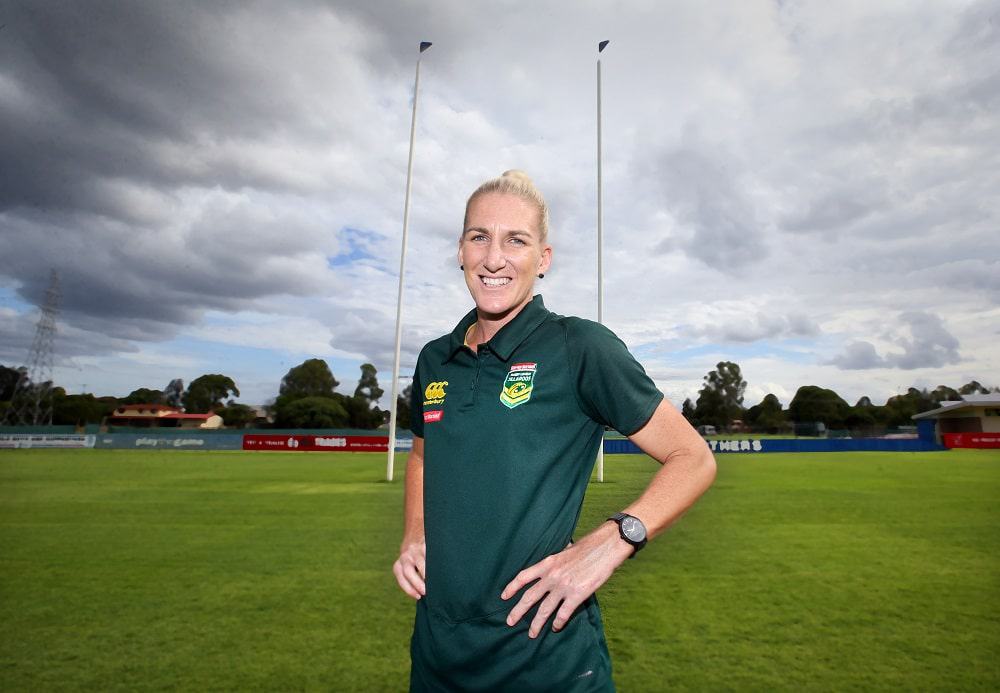Ipswich’s Ali Brigginshaw has been described as arguably the best rugby league player in the world.
Out for 12 months after an injury nearly ended her career in 2015, the versatile sportswoman became the 2016 Australian Golden Gloves Novice A Champion in the 69kg division, won the 2017 Rugby League Interstate Challenge and the 2017 Rugby League World Cup.
Our childhood shapes the way we see the world.
Recently, little girls and boys have started to look up and see women playing at elite levels in sports that were traditionally male dominated domains.
They see women they can imitate. Their time has finally come.
The NRL framework is in place for little girls who love football to finally see their dreams come true.
This year, for the first time ever, there is a pathway from juniors all the way to Jillaroos. Ipswich’s own Jillaroo, Ali Brigginshaw, is helping to pioneer the women’s football movement.
When Brigginshaw was young she could only play at club level until she was 12, which was devastating at the time.
“I played with boys from 10 to 12 years then I could play anymore, because of the rules. I had to go and play touch football,” she said.
“We are starting to get to the girls who have come through the whole system and they are completely different players.
“They are really advanced and we’ve seen that when we’ve gone to the under-15 comps. The ability of them is unbelievable, so that’s exciting.” Brigginshaw is passionate about her community and giving back. “I owe Ipswich for everything based on league,” she said.
“Ipswich is huge for rugby league and I’ve had so much support since I was 10. Being the only girl at every football game and knowing that Ipswich was always behind me, I’m always trying to give back.
“Right now I’m really working on making sure Ipswich is out there whenever I go anywhere. I remember where I came from.”
Brigginshaw will appear alongside former players Allan Langer, Paul Sironen, Greg Conescu and Ipswich Jets coach Shane Walker at the League Legends Lunch on Friday, 2 March at the Racehorse Hotel.
Profits will be donated to support little Samantha Pride’s fight with cancer.
“It means a lot to help their family,” Brigginshaw said of the upcoming event. “I have met the family as I used to coach her older sister Jule when she played competition league a few years ago.”
Coaching is another way for Brigginshaw to give back to up-and-coming Ipswich players.
“I love coaching, it’s my way of giving back, but with a little bit of jealously because I wish that was me at that age,” she said.
Brigginshaw’s own personal league legend is her dad Larry Brigginshaw, a decorated halfback who played with Brisbane Easts in the early 80s and toured England wearing a jersey for Queensland alongside Wally Lewis, Mal Meninga and Paul Vautin.
“I try to follow in his footsteps, he was my main idol. He played in the halves, half or five-eighth, the position I play,” she said.
Despite her obvious talent from an early age, Brigginshaw’s dad was reluctant to let her play competitive rugby league.
“It was hard to start with, he wouldn’t let me play,” she said.
“When I was a little girl he just thought I wasn’t ready and didn’t know the rules enough.
“So he taught me how to tackle and then when he agreed that he thought I could tackle he took me down and I started playing at Norths.
“He made sure my brother could tackle first too before he was allowed to play.”
Women’s sport has come a long way but there are still plenty of hurdles to clear.
Most of the women who play have full time jobs, meaning they have to fit training in around their job and often lose money when they take time off to travel and compete.
This year six teams will play for the first time as the NRL Women’s Premiership launches.
The competition will feature 40 Jillaroo players who will be centrally-contracted.
“Having the NRL competition this year is great because I love playing and by giving the girls some income they can play semi-professional, hopefully without having to work full-time jobs,” Brigginshaw said.
“We don’t need to be millionaires but it would be great if people can play comfortably and be able to pay their bills.”
Another hurdle cleared is this year’s inaugural women’s State of Origin.
Queensland Women have been playing an Interstate Challenge against New South Wales for the past 19 years, but this year it will be called what it really is.
The Women’s State of Origin will be a stand-alone game in June with teams playing on a Friday night and the action broadcast live on Channel 9.
“This is the first time ever that we will be playing a game that is not tagged onto a men’s game,” Brigginshaw said.
“Everyone who is tuning in will be to watch us, not just because they are there for the men anyway.”
A trailblazer in women’s sport, Brigginshaw is excited about the future.
“It’s all going to happen this year,” she said.
NRL Stats (2016)
Females playing rugby league across australia in schools and clubs
Females involved in playing the game across australia (touch, tag or tackle)
Female members across the 16 NRL Clubs
%

